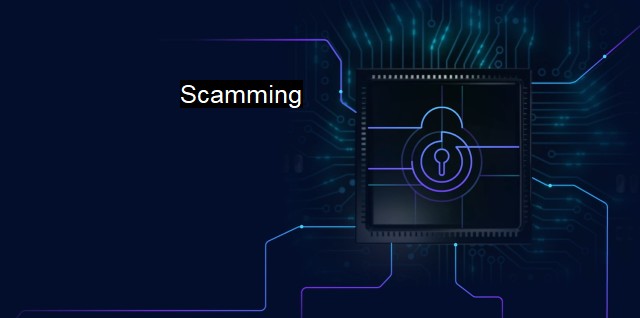What is Scamming?
Rising Cybercrimes: Combatting Scammers in the Age of Digital Technology and Antivirus Protection
Scamming, from the context of cybersecurity and antivirus, refers to deceptive practices implemented by individuals, known as scammers, to exploit computer networks and technologies for malicious intentions. Scammers, often cybercriminals, deliberately perform dishonest schemes designed to defraud people of their possessions, such as money or personal information on the cyberspace. The scamming methods can take different forms, but they rest on persuading the victims to reveal confidential data or engaging in financial transactions under false pretenses.The scamming landscape in cyberspace is broad, rife with varying tricks that range from simple tactics like phishing emails to sophisticated strategies such as ransomware and banking Trojans. Phishing, for instance, involves scam emails disguising as legitimate communications from genuine platforms like banks or popular online services. The victims are lured into clicking a hyperlink infused with malware or volunteering sensitive information such as credit card details or login credentials.
Ransomware represents another popular scamming technique where cybercriminals lock users out of their computer or network systems until a ransom (usually cryptocurrency) is paid. Taking a more covert approach, banking Trojans are malicious programs that present themselves as genuine software to steal bank account information from users’ devices.
Notably, the presence of antivirus software brings hope in the battle against scamming. An updated, high-quality antivirus provides real-time protection against not standard virus attacks but also varied forms of scamming threats, including ransomware, phishing, Trojans, among others. It harnesses the mechanisms of blocking suspicious websites and email attachments, scanning the user system to detect and delete vulnerabilities, updating vulnerability databases regarding newly developed malwares, and even include password managers and firewalls to improve the users’ inherent security.
While antivirus software significantly reduces the risks associated with scamming, it cannot invulnerably protect against it. For instance, scammers might use social engineering efforts like quid pro quo - a situation where a scammer offers a service or advantage exchange for information or access. Here, they're appealing to human psychology rather than engaging any specialized technological attack, making it difficult for antivirus software to prevent.
Scareware is another technique where scammers trick people into downloading malware by pretending to be antivirus software. Unsuspecting victims are scared into believing their computers are highly infected, and buying or installing the recommended "antivirus" would solve their problems. Instead, they're being tricked into downloading what could, in fact, be ransomware, spyware, or another sort of malware, leading to a disastrous compromise of their information.
Celebrating antivirus as a suitable counter to scamming needs one to consider specific constructs – it needs to be well-rounded and up-to-date. For incoming threats, cybersecurity tools should always be updated to recognize and fight off the ever-evolving scamming attempts. As new phishing techniques, ransomware, and Trojans roll out, the antivirus provider must adapt consistently.
In addition to cybersecurity, trainable precautions such as awareness and information regarding online safety practices are the first line of defense in avoiding scams. Knowing how to identify a fraudulent email or suspicious website, understanding not to give out personal data over the Internet, and even steps as simple as enabling two-factor authentication can drastically reduce the risk of falling prey to scammers.
While scamming presents a pervasive problem in our increasingly tech-dependent and interconnected world, well-rounded defenses consisting of sophisticated antivirus software and everyday cybersecurity hygiene can help individuals safeguard their information and financial assets against scams' malicious activities. Despite scammers continually evolving their tactics and tools, the cybersecurity community maintains their dedication to innovate and update protective strategies, enhancing safety in the online sphere.

Scamming FAQs
What is a scam?
A scam is a fraudulent activity, often carried out online, that attempts to trick people into giving away their personal or financial information or money. Scams are usually disguised as legitimate offers or requests, but they are designed to deceive and defraud people.How can I avoid getting scammed online?
To avoid getting scammed online, you should always be cautious and skeptical of unsolicited emails, messages, or phone calls. Make sure to verify the identity of the sender or caller, especially if they are asking for personal information or money. You should also use reliable antivirus software that can detect and block fraudulent activity.What should I do if I've been scammed?
If you've been scammed online, you should report the incident to your bank or credit card company immediately to prevent further unauthorized transactions. You should also notify the authorities, such as the local police or the Federal Trade Commission, and provide them with any relevant information, such as the scammer's contact details or the nature of the scam.What are some common types of scams that I should be aware of?
There are many types of scams that you should be aware of, such as phishing scams, which use fake websites or emails to obtain your personal or financial information; tech support scams, which involve fake tech support providers who claim to fix your computer or phone; and romance scams, which involve fake online romances that ask for money or gifts. Other common scams include investment scams, lottery scams, and charity scams.| | A | | | B | | | C | | | D | | | E | | | F | | | G | | | H | | | I | | | J | | | K | | | L | | | M | |
| | N | | | O | | | P | | | Q | | | R | | | S | | | T | | | U | | | V | | | W | | | X | | | Y | | | Z | |
| | 1 | | | 2 | | | 3 | | | 4 | | | 7 | | | 8 | | |||||||